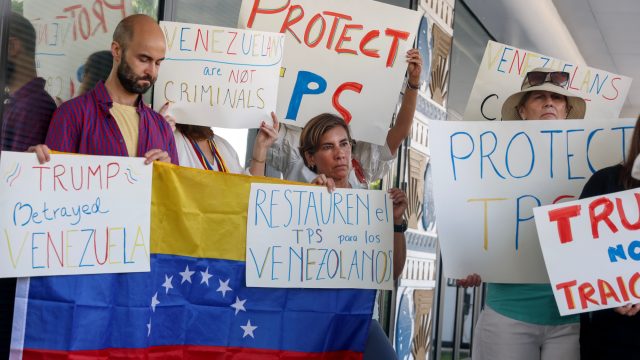
What happened
The Supreme Court gave the Trump administration a win this week and a loss last week, allowing it to revoke, for now, protected status for Venezuelan migrants but preventing it from deporting dozens of men held in Texas under the Alien Enemies Act. A judge had earlier halted the administration’s attempt to cancel the Biden-era extension of Temporary Protected Status for almost 350,000 Venezuelans; the Supreme Court has now lifted that injunction while an appeals court reviews the case. In a separate 7-2 ruling, though, the justices extended a pause on the Texas deportations and sent the case to an appeals court. That ruling criticized the government’s efforts to quickly remove the men, mostly Venezuelans the administration alleges are gang members, without allowing them time to contest their deportations in court. The ruling didn’t address whether the use of the Alien Enemies Act is legal.
Meanwhile, a federal judge in Boston sharply rebuked the administration this week, at a hearing requested by lawyers for a group of immigrants who were told they were being sent to politically unstable South Sudan. U.S. District Judge Brian E. Murphy said those removals “unquestionably” violated his previous order barring rapid deportations to third-party countries and that the officials involved could face criminal charges. “This seems like it may be contempt,” he said. He ordered the government to maintain U.S. custody of the eight deportees once they landed; the plane apparently touched down in Djibouti, where the U.S. has a military base.
What the columnists said
The Supreme Court ruling allowing the administration to lift Venezuelans’ protected status is a “victory for the rule of law, separation of powers, and common sense,” said National Review in an editorial. Weighing “the danger to national security imposed by an influx of insufficiently vetted nationals” from a hostile country “plagued by gang violence” is a matter for the current executive branch, not its predecessor or the courts.
The justices weren’t so deferential in their ruling on the Texas deportations, said Jason Willick in The Washington Post. The court ruled unanimously last month that migrants targeted under the Alien Enemies Act have a right to challenge their removal in court and must be given adequate time to do so. Yet a mere two weeks later, the administration “tried an end run around” that ruling by providing detainees only 24 hours’ notice of their impending deportations. That backfired. The justices “don’t like being played for chumps.”
In fact, the Supreme Court was so irate, it “pointedly did not wait” for the appeals court to weigh in, said Mark Joseph Stern in Slate. For seven justices, “it was not a close call: The government’s attempt to disappear migrants to a foreign black site is egregiously unconstitutional.” The ruling also shows skepticism that the administration is operating in good faith. The majority now appears to doubt whether this White House can be “trusted to respect the rights of any migrants.”
The Supreme Court will allow the Trump administration to end protected status for Venezuelans, but blocks deportations under the Alien Enemies Act





